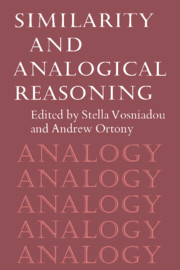Book contents
- Frontmatter
- Contents
- Preface
- List of contributors
- Similarity and analogical reasoning: a synthesis
- Part I Similarity and the structure of concepts
- Part II Analogical reasoning
- 7 The mechanisms of analogical learning
- 8 A computational model of analogical problem solving
- 9 Use of analogy in a production system architecture
- 10 Toward a microstructural account of human reasoning
- 11 Analogy and the exercise of creativity
- 12 Comments on Part II: Levels of description in information-processing theories of analogy
- 13 Comments on Part II: The role of explanation in analogy; or, The curse of an alluring name
- Part III Similarity and analogy in development, learning, and instruction
- Afterword: Comments on Parts I, II, and III: A framework for a theory of comparison and mapping
- Name index
- Subject index
13 - Comments on Part II: The role of explanation in analogy; or, The curse of an alluring name
Published online by Cambridge University Press: 22 October 2009
- Frontmatter
- Contents
- Preface
- List of contributors
- Similarity and analogical reasoning: a synthesis
- Part I Similarity and the structure of concepts
- Part II Analogical reasoning
- 7 The mechanisms of analogical learning
- 8 A computational model of analogical problem solving
- 9 Use of analogy in a production system architecture
- 10 Toward a microstructural account of human reasoning
- 11 Analogy and the exercise of creativity
- 12 Comments on Part II: Levels of description in information-processing theories of analogy
- 13 Comments on Part II: The role of explanation in analogy; or, The curse of an alluring name
- Part III Similarity and analogy in development, learning, and instruction
- Afterword: Comments on Parts I, II, and III: A framework for a theory of comparison and mapping
- Name index
- Subject index
Summary
Introduction
Artificial intelligence has a long and continuing interest in analogy (Burstein, 1985; Carbonell, 1985; Evans 1968; Forbus & Gentner, 1983; Kedar-Cabelli, 1985; Winston, 1980). From a computational point of view, more controversy surrounds analogy than any other single topic in the cognitive arena. From the perspective of an outsider, researchers appear to be doing wildly different things, all under the rubric of analogy. Perhaps this is just the natural result of a healthy diversity of thought. On the other hand, it may be a manifestation of the seductive name analogy. Somehow, “analogy” and “intelligence” seem to go hand in hand. The notion of researching analogy conjures up the illusion, at least, that one is directly addressing the problems of thinking and reasoning. Why is this? One possible reason is that analogy truly is central to thought. Several researchers have advanced the claim that thought is primarily metaphorical or analogical. A more cynical view is that analogy is a fuzzy concept that means different things to different people. But so is intelligence. Though researchers do not agree on what either term means, they can concur with abstract claims like “analogical reasoning is a fundamental component of intelligence”. It is perhaps this view that prompted Saul Amarel at the 1983 International Machine Learning Workshop to propose a moratorium on the term analogy in machine learning. Perhaps the field has fallen prey to a seductive term.
Information
- Type
- Chapter
- Information
- Similarity and Analogical Reasoning , pp. 346 - 366Publisher: Cambridge University PressPrint publication year: 1989
Accessibility standard: Unknown
Why this information is here
This section outlines the accessibility features of this content - including support for screen readers, full keyboard navigation and high-contrast display options. This may not be relevant for you.Accessibility Information
- 11
- Cited by
